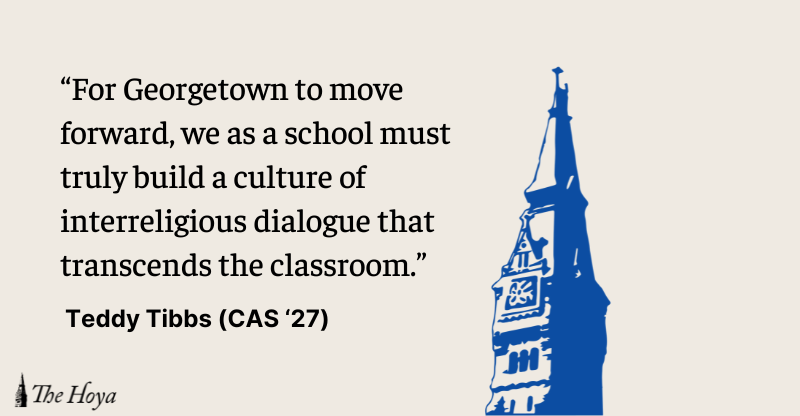
At 3:30 p.m. on Friday, Aug. 30, Georgetown University informed its community that two acts of anti-Catholic violence had taken place on campus the night before. Both a crucifix — which the Catholic community uses for mass in Dahlgren Chapel — and a statue of Mary standing by the Heyden Observatory gardens were found desecrated. One week later, the university has not made public any further information regarding who is responsible.
Like many members of the Georgetown Catholic community, my initial reaction was one of disgust and distrust. According to CatholicVote, a Catholic non-profit advocacy group, there have been 449 attacks on Catholic churches in the United States since May 2020. Just this year alone, some 55 churches have been attacked. In just the Washington, D.C. area, 11 churches have been targets of anti-Catholic violence. Most of these local acts include the disfiguring of religious statuaries. Moreover, vandals have sprayed over Church property with hateful graffiti — ranging from Nazi and Satanic imagery to attacks on the Church’s anti-abortion advocacy.
The Catholic community isn’t the only faith community in the United States to see an uptick in anti-religious violence, with much of it stemming from global conflicts such as the Israel-Hamas war. According to the Anti-Defamation League, an organization that tracks antisemitism in the United States, 2023 saw the highest number of antisemitic violence since the League started recording data in the 1970s. Similarly, according to the Council of American-Islamic Relations, discrimination against Muslim Americans saw an 182% jump in the 16 days after the war began Oct. 7. Physical attacks on members of faith communities and their religious spaces have become more common.
Talk to members of any religious community at Georgetown, and you will discover an increased culture of fear on this campus. Many feel like they can’t express their identity as people of faith due to social pressure. Furthermore, many feel simply misunderstood by those who do not practice the same faith tradition. Sometimes it’s awkward or difficult for a friend to explain why they might be attending a religious service or why they might hold traditional faith-based political views — I’ve certainly had that experience. The faithful quickly fear that they might be labeled as an “other” when they just want to be part of the group. At Georgetown, we are a community in diversity, a phrase coined by Fr. Arturo Sosa, S.J., superior general of the Society of Jesus. Friends can and should civilly disagree on the issues that ignite our generation. I see no reason why Hoyas can’t.
For Georgetown to move forward, we as a school must truly build a culture of interreligious dialogue that transcends the classroom. Together, we can break down the cultural stigma around faith. I ask the community to examine the religious traditions of the world, whether it be attending a service, meditation or spiritual discussion — Campus Ministry, for example, offers dozens of events weekly for dialogue, prayer and forging community with others both within and outside your own faith. If you are a person of faith, educate yourself on your own faith tradition as well. I call on people of all traditions to listen. Listen to people’s experiences. Listen to people’s viewpoints. Listen to people’s stories. We will all be better for it.
I trust we can all agree that anti-religious violence has no home on this campus. Vandalism has no home on this campus. Hate has no home on this campus. This is our home. Some of the best people I know live, study and work here. Our home is built on the foundations of love for one another and the pursuit of good. I ask readers to not despair in these acts of hate but to seek the good and true. As Pope Francis said, “Situations can change; people can change. Be the first to seek to bring good. Do not grow accustomed to evil, but defeat it.” Learn, listen and live for others, because only then can we defeat evil with the pursuit of the good.
Teddy Tibbs is a sophomore in the College of Arts & Sciences.